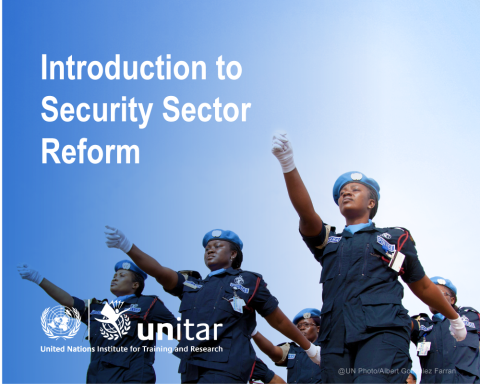
Introduction to Security Sector Reform [PTP.2024.09E]
Security sector reform (SSR) is a nationally-owned process aimed at ensuring that security and justice providers are accountable to the state and its people; deliver effective, efficient and affordable security and justice services that meet the people’s needs; operate within a framework of good governance, rule of law, and respect for human rights; and are legitimate. SSR addresses a number of problems such as the ineffective provision of security and justice services; the inability of security and justice institutions to deliver their services equally in response to the needs of all groups of society; the lack or absence of independent and well-functioning accountability and oversight mechanisms.
The goal of the course is to offer an overview of the concept of SSR, highlight the key SSR actors and their roles and outline the implementation of SSR programmes.
At the end of the course, participants will be able to:
- Define security sector reform;
- List the key SSR actors and describe their roles and responsibilities;
- Outline the implementation of SSR programmes.
The course is structured in four lessons that will be covered over three hours:
- Lesson 1: Introduction to the concept of SSR
- Lesson 2: Understanding the SSR context
- Lesson 3: Key actors and coordination of SSR processes
- Lesson 4: International support to an SSR process
UNITAR PTPU adopts an approach to training that highlights experiential and collaborative learning. This approach focuses on the learning needs, interests and styles of participants to ensure the relevance and retention of content and puts particular emphasis on the active participation of learners through practice-oriented learning environments. UNITAR PTP’s approach allows participants to share knowledge and experiences and contribute dynamically to the learning process. Through this process, participants not only acquire information but also contribute to the construction of knowledge in a way that is meaningful and directly applicable to the reality of peace operations. Instructors guide participants through this process, delivering and conveying information, clarifying doubts and supporting participants through different activities. UNITAR PTP’s approach to training puts particular emphasis on monitoring and evaluation. This process continuously develops course structure and activities to better suit participants’ areas of interest. This also allows for a review process that systematically improves course design and implementation for future versions of the course.
Participants are not expected to have prior experience in or knowledge of protection of civilians. However, as this is an advanced course, participants must:
- Have a sound understanding of the structure and functioning of a peace operation;
- Have a university degree in a relevant area with proven interest in security sector reform (BA or equivalent) or the equivalent working experience in a relevant field (2 to 4 years);
- Have good command of English language (reading and writing);
- Be computer literate.
The course is based on level one "Introduction to Security Sector Reform" course developed by the International Security Sector Advisory Team (ISSAT).
Technical Requirements
UNITAR recommends the following as a minimum in hardware and software to take our e-Learning courses. Please consult your Network Administrator or Systems person to ensure that you have the following:
Hardware requirements
- Desktop or laptop computer with Windows 10 or MacOS version 11 and later
- Tablet or mobile devices are not fully supported on some course tools
- Stable LAN or Wifi Internet connection
Browser
- Latest version of Mozilla Firefox (download for free at https://www.mozilla.org)
- Latest version of Google Chrome (download for free at https://www.google.com/chrome)
- Microsoft Edge or Safari (included in your computer)
Other software
- PDF reader (download for free at https://get.adobe.com/uk/reader)
- Microsoft Office for Windows or MacOS (compatible software can be downloaded at http://www.openoffice.org/)
- Video player (Quicktime for MacOS, Windows Media Player or compatible video player)
- Anti-virus
Other requirements
- Disable Pop-up blockers
- Enable cookies and java
- webcam and audio headset for courses that will require online meetings
- additional storage in case you need to download course materials
You will receive an email with the information on how to access the course within 48 hours. Please kindly check your spam or junk inbox.

